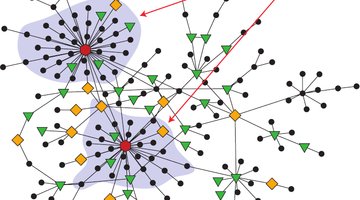Decomposition and Discovery of Complex Networks
Dates: from Sept. 1, 2010 to Aug. 31, 2014
Funder: FP7 (European Union)
Project id: FP7-PEOPLE-2010-RG 268342
Total Funding: 100,000€
Visit the project web page
In complex systems, individual components interact with each other often in non-linear ways via a non-trivial network of interactions. The structure of such network of interactions affects that system's dynamics and conveys information about the functional needs of the system, its evolution, and the role of individual units. For these reasons, network analysis has become a cornerstone of fields as diverse as systems biology, economics and sociology. In these fields, the advance of technology has boosted our capacity to gather increasing amounts of data on large complex systems. Unfortunately, our understanding has not grown proportionally. Two of the main reasons for such disparity are: (i) that we lack a complete set of tools to summarize information and transform it into practical knowledge; (ii) he reliability of network data is often a source of concern and poses serious questions about the validity of the conclusions of network studies. The proposed research addresses these the two issues outlined above based on two premises: (i) that group-based models, or more generally block models, are good descriptors of patterns of interactions between nodes in a network, and (ii) that every observed pattern of interactions is the result of the overlay of several block models. The overarching goal of the proposal is to develop a framework that enables the identification of a set of orthogonal block models, and the discovery of complex networks from sparse/incomplete empirical data sets; and to apply this framework to problems in systems biology. The research I propose is innovative in its ideas and will shed light on the mechanisms that shape network structure. Importantly, because the methodology I will develop is based solely on the topology and is independent of network context, the outcomes from this research are bound to have a major impact in a number of areas including social sciences, economics and biology.
Publications
- iMet: A network-based computational tool to assist in the annotation of metabolites from tandem mass spectra - Anal. Chem. 89 (6) , 3474 -3482 (2017).
- Inferring propagation paths for sparsely observed perturbations on complex networks - Sci. Adv. 2 , e1501638 (2016).
- Multilayer stochastic block models reveal the multilayer structure of complex networks - Phys. Rev. X 6 , 011036 (2016).
- Long-term evolution of email networks: statistical regularities, predictability and stability of social behaviors - PLOS ONE 11(1) , e0146113 (2016).
- A comprehensive study on different modelling approaches to predict platelet deposition rates in a perfusion chamber - Sci. Rep. 5 , 13606 (2015).
- Mapping high-growth phenotypes in the flux space of microbial metabolism - J. R. Soc. Interface 12 , 20150543 (2015).
- The acute impact of polyphenols from Hibiscus sabdariffa in metabolic homeostasis: an approach combining metabolomics and gene-expression analyses - Food Funct. 6 , 2957 -2966 (2015).
- Scaling and optimal synergy: Two principles determining microbial growth in complex media - Phys. Rev. E 91 , 062703 (2015).
- Control of cell–cell forces and collective cell dynamics by the intercellular adhesome - Nat. Cell Biol. 17 , 409 -420 (2015).
- Identifying strategies for mitigating the global warming impact of the EU-25 economy using a multi-objective input–output approach - Energ. Policy 77 , 21 -30 (2015).
- Cavity approach for modeling and fitting polymer stretching - Phys. Rev. E 90 , 052708 (2014).
- A Network Inference Method for Large-Scale Unsupervised Identification of Novel Drug-Drug Interactions - PLOS Comput. Biol. 9 (12) , e1003374 (2013).
- Energy metabolism and glutamate-glutamine cycle in the brain: a stoichiometric modeling perspective - BMC Systems Biology 7 , 103 (2013).
- A Novel Methodology to Estimate Metabolic Flux Distributions in Constraint-Based Models - Metabolites 2013 , 838-852 (2013).
- Predicting future conflict between team-members with parameter-free models of social networks - Sci. Rep. 3 , art. no. 1999 (2013).
- The impact of individual biases on consensus formation - PLOS ONE 8 (5) , e58989 (2013).
- Phenomenological model for predicting the catabolic potential of an arbitrary nutrient - PLOS Comput. Bio. , 8(11): e1002762 (2012).
- Predicting Human Preferences Using the Block Structure of Complex Social Networks - PLOS ONE 7 (9) , e44620 (2012).
- Evolutionary Conservation of Species’ Roles in Food Webs - Science 335 , 1489 -1492 (2012).
- Justice Blocks and Predictability of US Supreme Court Votes - PLOS ONE 6 (11) , e27188 (2011).
- Modular coherence of protein dynamics in yeast cell polarity system - Proc. Natl. Acad. Sci. U. S. A. 108 , 7647 -7652 (2011).

